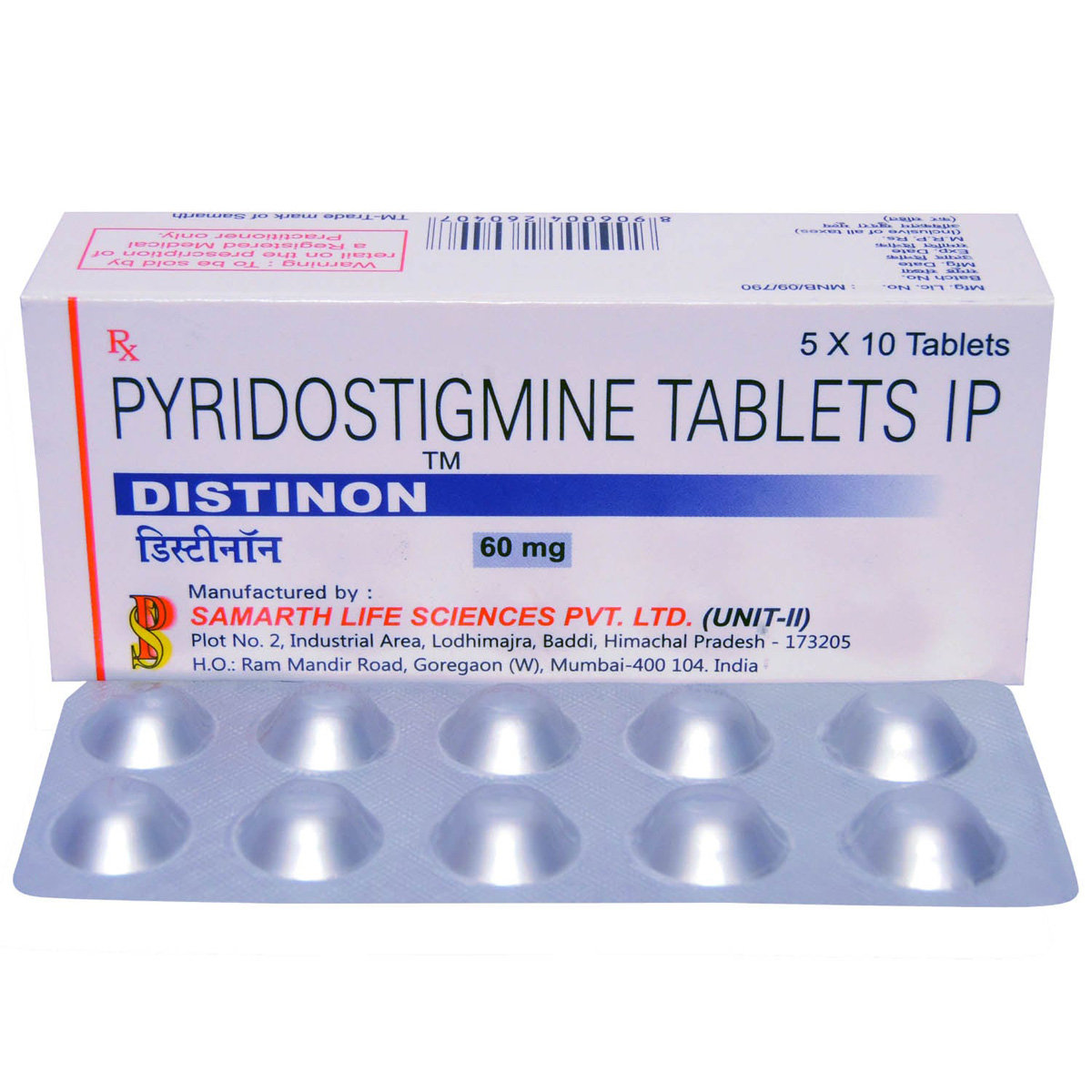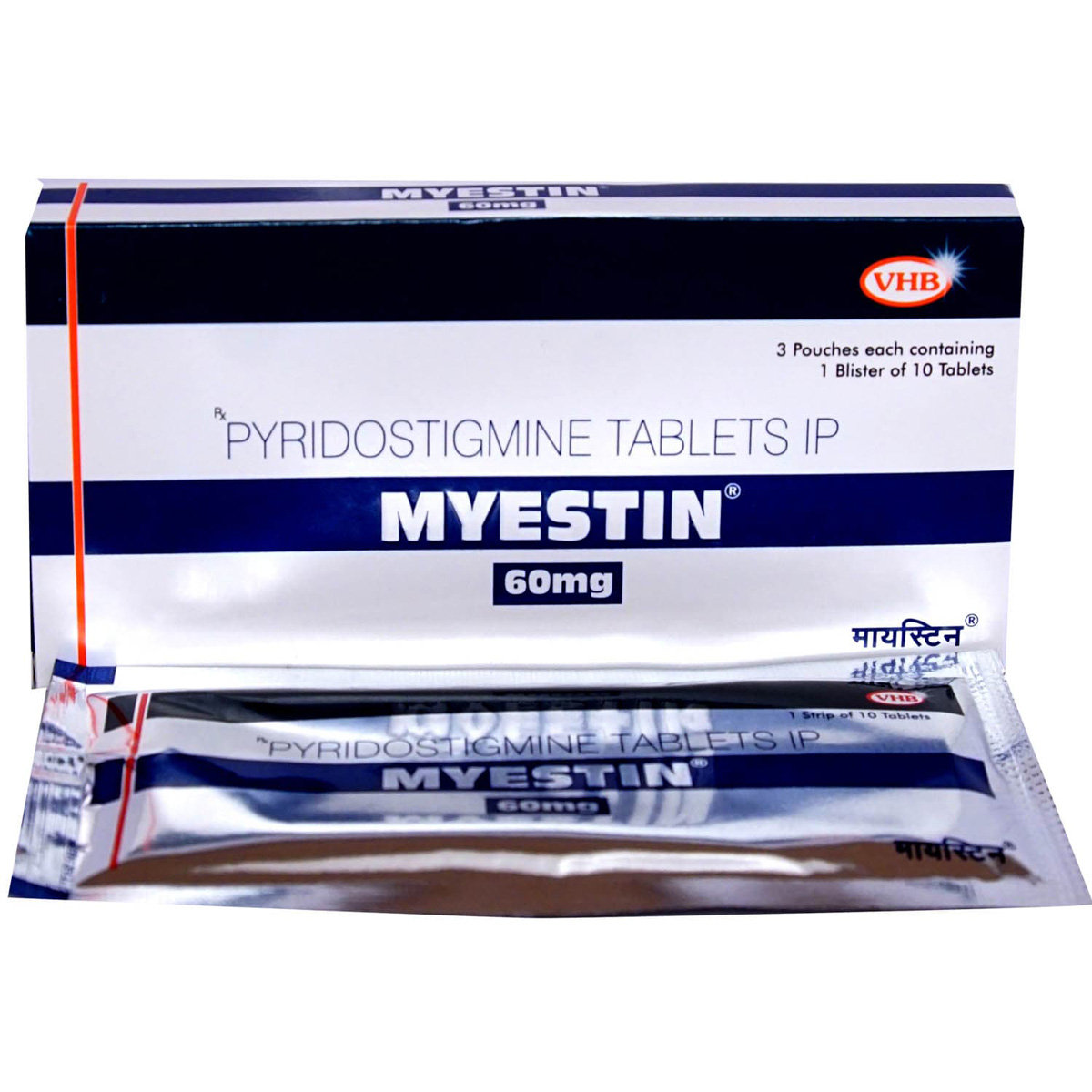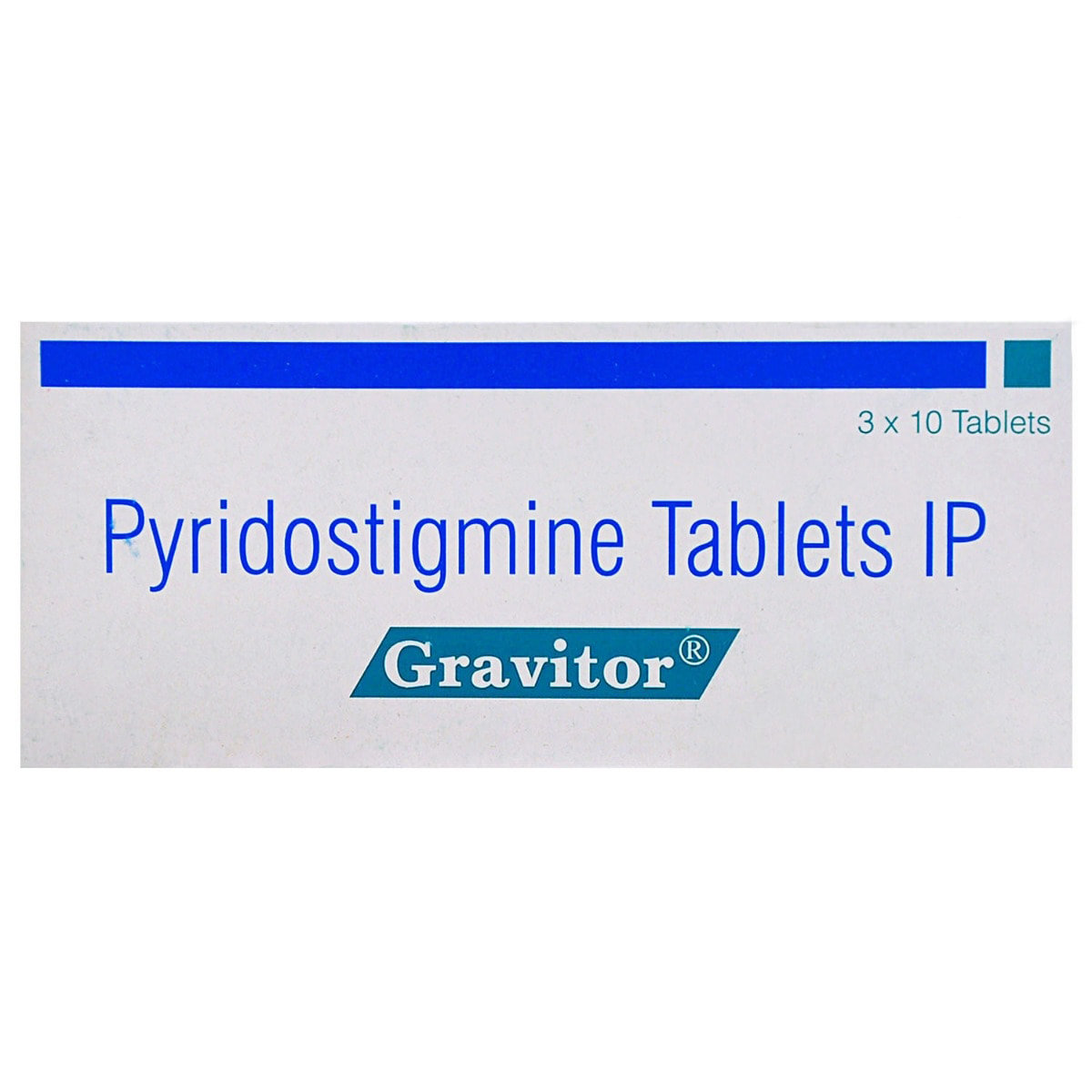Ridomine-60 Tablet 10's
MRP ₹141
(Inclusive of all Taxes)
₹21.1 Cashback (15%)
Provide Delivery Location
Online payment accepted
 Prescription drug
Prescription drugWhats That
Composition :
Manufacturer/Marketer :
Consume Type :
Expires on or after :
Return Policy :
About Ridomine-60 Tablet
Ridomine-60 Tablet belongs to the group of medicines called cholinesterase inhibitors used to treat myasthenia gravis (muscle weakness). Besides this, Ridomine-60 Tablet also streats paralytic ileus (a rare form of constipation), postoperative urinary retention, and prophylaxis to military exposuree to any nerve poisoning gas. Myasthenia gravis is a long term neuromuscular disease that leads to musculoskeletal weakness caused by excess activity of a cprotein.cholinesterase protein
Ridomine-60 Tablet contains ‘Pyridostigmine’ which works by stopping the excessive cholinesterase activity (an enzyme required for the breakdown of a neurotransmitter called acetylcholine) involved in communication between nerve impulses and muscle movements. Thereby, Ridomine-60 Tablet helps in proper muscle functioning and prevents muscle weakness.
Take Ridomine-60 Tablet 30-60 minutes before food. Swallow Ridomine-60 Tablet as a whole; do not crush or chew the tablet. You are advised to take Ridomine-60 Tablet for as long as your doctor has prescribed it for you depending on your medical condition. In some cases, you may experience certain common side-effects such as stomach pain, nausea, vomiting, diarrhoea, sweating, cough with mucus, rash, muscle cramps, and blurred vision. Most of these side-effects do not require medical attention and will resolve gradually over time. However, you are advised to talk to your doctor if you experience these side-effects persistently.
Inform your doctor before taking Ridomine-60 Tablet if you have asthma, high blood pressure, glaucoma, breathing problems, coronary obstruction, stomach ulcer, epilepsy, Parkinson’s disease, or kidney problems. Consult your doctor before taking Ridomine-60 Tablet if you are pregnant before taking Ridomine-60 Tablet if you are pregnant or breastfeeding. Ridomine-60 Tablet may cause dizziness and vision problems; so, drive or operate machinery only if you are alert. Avoid consuming alcohol while taking Ridomine-60 Tablet as it may cause increased dizziness. Ridomine-60 Tablet can be given to children if prescribed by the doctor; the dose depends upon the child’s age. Keep your doctor informed about your health condition and medicines you are taking to rule out unpleasant side-effects.
Uses of Ridomine-60 Tablet
Directions for Use
Key Benefits
Ridomine-60 Tablet belongs to the group of medicines called cholinesterase inhibitors used to treat myasthenia gravis (muscle weakness). Ridomine-60 Tablet works by stopping the excessive activity of cholinesterase, thereby helps the muscles to work properly. Additionally, Ridomine-60 Tablet is also used to treat paralytic ileus (a rare form of constipation), postoperative urinary retention, and prophylaxis to soman nerve agent poisoning. Ridomine-60 Tablet affects the chemicals in the body which are involved in communication between nerve impulses and muscle movements. Thereby, Ridomine-60 Tablet helps in treating myasthenia gravis.
Storage
Drug Warnings
Do not take Ridomine-60 Tablet if you are allergic to any of its contents; if you are constipated or cannot urinate unless prescribed by the doctor. Inform your doctor before taking Ridomine-60 Tablet if you have asthma, high blood pressure, glaucoma, breathing problems, coronary obstruction, stomach ulcer, epilepsy, Parkinson’s disease, kidney problems, vagotonia (overactive vagus nerves), overactive thyroid; if you have had surgery to remove thymus gland or if you due to have any surgery. Consult your doctor before taking Ridomine-60 Tablet if you are pregnant before taking Ridomine-60 Tablet if you are pregnant or breastfeeding. Ridomine-60 Tablet may cause dizziness and vision problems; so, drive or operate machinery only if you are alert. Avoid consuming alcohol while taking Ridomine-60 Tablet as it may cause increased dizziness.
Drug-Drug Interactions
Drug-Drug Interactions
Login/Sign Up
Drug-Food Interactions
Drug-Food Interactions
Login/Sign Up
Diet & Lifestyle Advise
- Maintain a healthy weight. Include vegetables, fruits and grains in your diet.
- Diet low in fat, saturated fat and cholesterol would be helpful.
- Use salt and sugars in moderation.
- Avoid consumption of alcohol.
- Avoid processed and fried foods.
- Try eating soft, mashed, or pureed foods as they are easy to swallow.
- Avoid dry, chunky and chewy foods.
- Regularly sip water during meals and snacks as it helps to moisten and soften the food.
- Add thickening agents to liquid foods as liquid foods may get into the lungs and cause choking.
- Be careful while swallowing foods and liquids.
Side Effects of Ridomine-60 Tablet
- Stomach pain
- Nausea
- Vomiting
- Diarrhoea
- Increased salivation (drooling)
- Sweating, cough with mucus
- Rash
- Muscle cramps
- Blurred vision
Habit Forming
Therapeutic Class
All Substitutes & Brand Comparisons
RX
Out of StockMygris 60mg Tablet
Bharat Serums and Vaccines Ltd
₹77.86
(₹7.01 per unit)
44% CHEAPERRX
Out of StockMUSTONE TABLET 10'S
Chandra Bhagat Pharma Ltd
₹101
(₹9.09 per unit)
28% CHEAPERRX
Out of StockPyrido 60mg Tablet
₹115
(₹10.35 per unit)
18% CHEAPER
Author Details
We provide you with authentic, trustworthy and relevant information
Drug-Diseases Interactions
Drug-Diseases Interactions
Login/Sign Up
FAQs
Drug-Drug Interactions Checker List
- ATROPINE
- GLYCOPYRROLATE
- PREDNISONE
- SUCCINYLCHOLINE
Special Advise
- Ridomine-60 Tablet might stop or increase the effects of skeletal muscle relaxants used in the surgery. Inform the doctor that you are taking Ridomine-60 Tablet .
- You should not use Ridomine-60 Tablet if you have a bladder or bowel obstruction.
- Ridomine-60 Tablet is not approved for use by anyone younger than 18 years old.
- Prolonged use of Ridomine-60 Tablet may cause gastrointestinal side effects due to increased gut peristalsis causing abdominal cramping, frequent bowel movements, or diarrhoea. However, these side effects can be managed with OTC items antidiarrheal preparations.
Disease/Condition Glossary
Myasthenia gravis: It is an autoimmune neuromuscular disease which causes skeletal muscle weakness. The immune system mistakenly attacks its own healthy tissue leading to damage of the neuromuscular membrane. This reduces the effect of acetylcholine, a neurotransmitter which is crucial for the communication between nerve cells and muscles. Myasthenia gravis occurs when the communication between nerve cells and muscles becomes impaired. This prevents crucial muscle contractions, thereby leads to muscle weakness. The most affected muscles are those of face and eyes. Symptoms of myasthenia gravis include double vision, drooping eyelids, difficulty chewing or swallowing, weakness, problems with lifting the objects, trouble talking and walking.
Paralytic ileus: It is a condition in which there is obstruction of the intestine due to paralysis of intestinal muscles. This prevents the passage of food and leads to their accumulation in the intestine. Paralytic ileus occurs due to malfunctioning of nerves and muscles in the intestine, thereby impairs the digestive movement.

Have a query?
Alcohol
Safe if prescribed
Avoid consuming alcohol while taking Ridomine-60 Tablet as it may cause increased dizziness.
Pregnancy
Consult your doctor
Ridomine-60 Tablet belongs to the pregnancy category C. Please consult your doctor before taking Ridomine-60 Tablet if you are pregnant or planning for pregnancy.
Breast Feeding
Consult your doctor
Small amounts of Ridomine-60 Tablet may pass into breastmilk. Please consult your doctor before taking Ridomine-60 Tablet if you are breastfeeding.
Driving
Safe if prescribed
Ridomine-60 Tablet may cause dizziness and vision problems. So, drive only if you are alert.
Liver
Consult your doctor
Dose adjustment may be needed. Please consult your doctor before taking Ridomine-60 Tablet if you have liver impairment/liver disease before taking Ridomine-60 Tablet .
Kidney
Consult your doctor
Dose adjustment may be needed. Please consult your doctor if you have any concerns regarding this or if you have kidney impairment/kidney disease before taking Ridomine-60 Tablet .
Children
Safe if prescribed
Not recommended for use in anyone less than 18 years of age









_0.jpg?tr=q-85)

